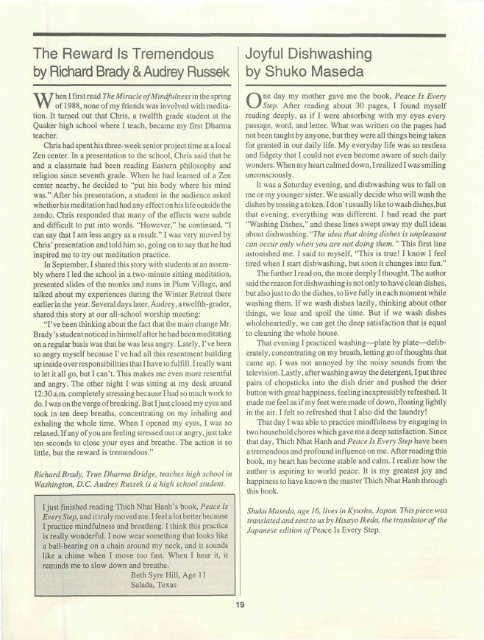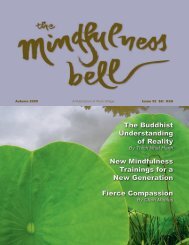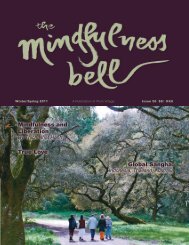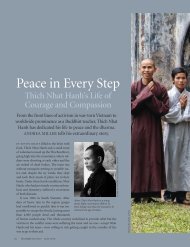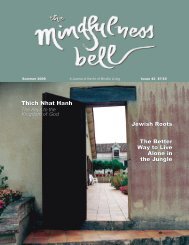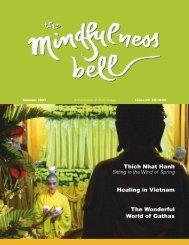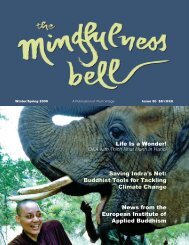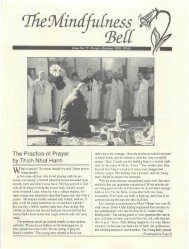J 'Bell - The Mindfulness Bell
J 'Bell - The Mindfulness Bell
J 'Bell - The Mindfulness Bell
You also want an ePaper? Increase the reach of your titles
YUMPU automatically turns print PDFs into web optimized ePapers that Google loves.
<strong>The</strong> Reward Is Tremendous<br />
by RichardBrady & AudreyRussek<br />
When I first read <strong>The</strong> Miracle of <strong>Mindfulness</strong>in the spring<br />
of 1988, noneofmyfriends was involved withmeditation.<br />
It turned out that Chris, a twelfth grade student at the<br />
Quaker high school where I teach, became my first Dharma<br />
teacher.<br />
Chris had spent his three-week senior project time at a local<br />
Zen center. In a presentation to the school, Chris said that he<br />
and a classmate had been reading Eastern philosophy and<br />
religion since seventh grade. When he had learned of a Zen<br />
center nearby, he decided to "put his body where his mind<br />
was." After his presentation, a student in the audience asked<br />
whether his meditation had had any effect on his life outside the<br />
zendo. Chris responded that many of the effects were subtle<br />
and difficult to put into words. "However," he continued, "I<br />
can say that Iam less angry as a result." Iwas very movedby<br />
Chris' presentation and told him so, going on to say that he had<br />
inspired me to try out meditation practice.<br />
In September, I shared this story with students at an assembly<br />
where I led the school in a two-minute sitting meditation,<br />
presented slides of the monks and nuns in Plum Village, and<br />
talked about my experiences during the Winter Retreat there<br />
earlierinthe year. Several days later, Audrey, a twelfth-grader,<br />
shared this story at our all-school worship meeting:<br />
"I'vebeen thinking about the fact that the main change Mr.<br />
Brady' s student noticed in himself after he had been meditating<br />
on a regular basiswas that he was less angry. Lately, I've been<br />
soangry myself because I've had all this resentment building<br />
up inside over responsibilities that I have to fulfill. I really want<br />
to letitall go, but I can't. This makes me even more resentful<br />
and angry. <strong>The</strong> other night I was sitting at my desk around<br />
12:30 a.m. completely stressing because I had so much work to<br />
do. I was on the verge of breaking. But I just closed my eyes and<br />
took in ten deep breaths, concentrating on my inhaling and<br />
exhaling the whole time. When I opened my eyes, I was so<br />
relaxed. If any of you are feeling stressedout or angry, just take<br />
ten seconds to close your eyes and breathe. <strong>The</strong> action is so<br />
little, but the reward is tremendous."<br />
Richard Brady, True Dharma Bridge, teaches high school in<br />
Washington, D.C. Audrey Russek is a high school student.<br />
I justFinished reading Thich Nhat Hanh's book, Peace Is<br />
Every Step, and it truly moved me. I feel a lot better because<br />
I practice mindfulness and breathing. Ithink this practice<br />
is really wonderful. Inow wear something thatlooks like<br />
a ball-bearing on a chain around my neck, and it sounds<br />
like a chime when I move too fast. When I hear it, it<br />
reminds me to slow down and breathe.<br />
Beth Syre Hill, Age 11<br />
Salada, Texas<br />
Joyful Dishwashing<br />
by Shuko Maseda<br />
One day my mother gave me the book, Peace Is Every<br />
Step. After reading about 30 pages, I found myself<br />
reading deeply, as if I were absorbing with my eyes every<br />
passage, word, and letter. What was written on the pages had<br />
not been taught by anyone, but they were all things being taken<br />
for granted in our daily life. My everyday life was so restless<br />
and fidgety that Icould not even become aware of such daily<br />
wonders. When my heart calmed down, I realized I was smiling<br />
unconsciously.<br />
Itwas a Saturday evening, and dishwashing was tofall on<br />
me or my younger sister. We usually decide whowill washthe<br />
dishes by tossing a token. I don't usually like to wash dishes,but<br />
that evening, everything was different. I had read the part<br />
"Washing Dishes," and these lines swept away my dull ideas<br />
about dishwashing. "<strong>The</strong> idea that doing dishes is unpleasant<br />
can occur only when you are not doing them." This first line<br />
astonished me. I said to myself, "This is true! I know I feel<br />
tired when Istart dishwashing, but soon it changes into fun."<br />
<strong>The</strong> further I read on, the more deeply I thought. <strong>The</strong> author<br />
said the reason for dishwashingis not only to have clean dishes,<br />
but also just to do the dishes, to live fully in each moment while<br />
washing them. If we wash dishes lazily, thinking about other<br />
things, we lose and spoil the time. But if we wash dishes<br />
wholeheartedly, we can get the deep satisfaction that is equal<br />
to cleaning the whole house.<br />
That evening I practiced washing—plate by plate—deliberately,<br />
concentratingonmy breath, letting go of thoughts that<br />
came up. I was not annoyed by the noisy sounds from the<br />
television. Lastly, after washing away the detergent, I put three<br />
pairs of chopsticks into the dish drier and pushed the drier<br />
buttonwith great happiness, feeling inexpressibly refreshed. It<br />
made me feel as if myfeet were madeof down, floating lightly<br />
in the air. I felt so refreshed that I also did the laundry!<br />
That day I was ableto practicemindfulness by engagingin<br />
two household chores which gave me a deep satisfaction. Since<br />
that day, ThichNhat Hanh and Peace Is Every Step have been<br />
a tremendous and profound influence on me. After reading this<br />
book,my heart has become stable and calm. I realize how the<br />
author is aspiring to world peace. It is my greatest joy and<br />
happinessto have known the master Thich Nhat Hanh through<br />
this book.<br />
Shuku Maseda, age 16, lives in Kyushu, Japan. This piece was<br />
translated and sent to us by Hisayo Ikeda, the translator of the<br />
Japanese edition of Peace Is Every Step.<br />
19


